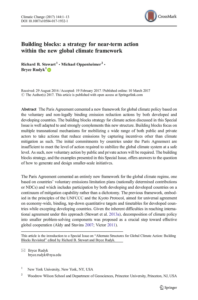The Paris Agreement cemented a new framework for global climate policy based on the voluntary and non-legally binding emission reduction actions by both developed and developing countries. The building blocks strategy for climate action discussed in this Special Issue is well adapted to and strongly complements this new structure. Building blocks focus on multiple transnational mechanisms for mobilizing a wide range of both public and private actors to take actions that reduce emissions by capturing incentives other than climate mitigation as such. The initial commitments by countries under the Paris Agreement are insufficient to meet the level of action required to stabilize the global climate system at a safe level. As such, new voluntary action by public and private actors will be required. The building blocks strategy, and the examples presented in this Special Issue, offers answers to the question of how to generate and design smaller-scale initiatives.
